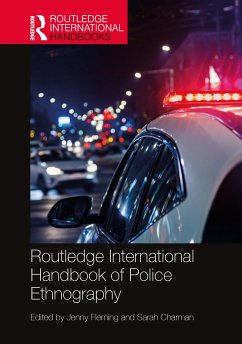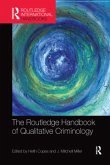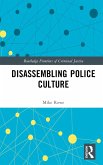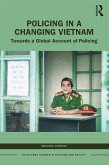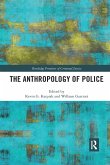Routledge International Handbook of Police Ethnography
Herausgeber: Fleming, Jenny; Charman, Sarah
Routledge International Handbook of Police Ethnography
Herausgeber: Fleming, Jenny; Charman, Sarah
- Gebundenes Buch
- Merkliste
- Auf die Merkliste
- Bewerten Bewerten
- Teilen
- Produkt teilen
- Produkterinnerung
- Produkterinnerung
The Routledge International Handbook of Police Ethnography offers an original and international contribution to the field of police studies and research methods, providing a comprehensive and overarching guide to police ethnography.
Andere Kunden interessierten sich auch für
![The Routledge Handbook of Qualitative Criminology The Routledge Handbook of Qualitative Criminology]() The Routledge Handbook of Qualitative Criminology49,99 €
The Routledge Handbook of Qualitative Criminology49,99 €![The Routledge International Handbook of Sensory Ethnography The Routledge International Handbook of Sensory Ethnography]() The Routledge International Handbook of Sensory Ethnography305,99 €
The Routledge International Handbook of Sensory Ethnography305,99 €![Disassembling Police Culture Disassembling Police Culture]() Mike RoweDisassembling Police Culture132,99 €
Mike RoweDisassembling Police Culture132,99 €![Policing in a Changing Vietnam Policing in a Changing Vietnam]() Melissa JardinePolicing in a Changing Vietnam52,99 €
Melissa JardinePolicing in a Changing Vietnam52,99 €![The Anthropology of Police The Anthropology of Police]() The Anthropology of Police47,99 €
The Anthropology of Police47,99 €![Translational Criminology in Policing Translational Criminology in Policing]() Translational Criminology in Policing41,99 €
Translational Criminology in Policing41,99 €![Applied Photovoice in Criminal Justice Applied Photovoice in Criminal Justice]() Wendy FitzgibbonApplied Photovoice in Criminal Justice78,99 €
Wendy FitzgibbonApplied Photovoice in Criminal Justice78,99 €-
-
-
The Routledge International Handbook of Police Ethnography offers an original and international contribution to the field of police studies and research methods, providing a comprehensive and overarching guide to police ethnography.
Produktdetails
- Produktdetails
- Routledge International Handbooks
- Verlag: Taylor & Francis Ltd
- Seitenzahl: 684
- Erscheinungstermin: 31. Januar 2023
- Englisch
- Abmessung: 250mm x 175mm x 41mm
- Gewicht: 1348g
- ISBN-13: 9780367539399
- ISBN-10: 036753939X
- Artikelnr.: 65903058
- Herstellerkennzeichnung
- Libri GmbH
- Europaallee 1
- 36244 Bad Hersfeld
- gpsr@libri.de
- Routledge International Handbooks
- Verlag: Taylor & Francis Ltd
- Seitenzahl: 684
- Erscheinungstermin: 31. Januar 2023
- Englisch
- Abmessung: 250mm x 175mm x 41mm
- Gewicht: 1348g
- ISBN-13: 9780367539399
- ISBN-10: 036753939X
- Artikelnr.: 65903058
- Herstellerkennzeichnung
- Libri GmbH
- Europaallee 1
- 36244 Bad Hersfeld
- gpsr@libri.de
Jenny Fleming is Professor of Criminology and Director of the Institute of Criminal Justice Research at the University of Southampton, UK, and Editor-in-Chief of Policing and Society. Sarah Charman is Professor of Criminology at the University of Portsmouth, UK, and Editor-in-Chief of the International Journal of Law, Crime and Justice.
SECTION ONE: MAPPING THE FIELD: HISTORIES, THEORIES AND CONTROVERSIES 1.The
Revival of Police Ethnography: Taking the road less travelled Jenny Fleming
and Sarah Charman 2.Police Ethnography: The Classic Era Tim Newburn 3.What
is ethnography? Methods, sensibility and product Megan O'Neill, Merlijn van
Hulst and Guido Noteboom 4.When is ethnography, 'real ethnography'? Jenny
Fleming and Rod Rhodes 5.Ethnography and the evidenced-informed police
practitioner Nigel Fielding 6.Untold stories of police ethnography Anna
Souhami 7.Philosophical Anthropology and the Premises of Research about the
Police Simon Holdaway and Sarah Charman SECTION TWO: ACCESS AND ETHICS 8.
Staying Cool in a Hot Spot: Epistemology, Ethics, and Politics in Police
Ethnography Jeffrey T. Martin and Austin D. Hoffman 9..White writing black
and blue: Who are our ethnographies for? Andrew Faull 10.A collaborator?
Ethnographic issues of police and peer suspicion David Sausdal 11.
Outsiders inside: An accidental ethnography of policing in Brazil Viviane
de O Cubas, Renato Alves and Roxanna Pessoa Cavalcanti 12.Access to Police
Organisations Peter K. Manning 13.Reflections on trust and acceptance in
ethnographic studies of policing: the importance of police role conception
Frederick Cram 14.Policed Ethnography: Ethical and Practical Considerations
Arising from Observations of Public Order Policing in Crowd Situations
Geoff Pearson and Charmian Werren 15.Deception, situated ethics and police
ethnography David Calvey 16.ACCESS NO AREAS? Breaching the world of armed
policing Oliver Clark-Darby 17.Access Denied: Navigating Access during
Ethnographic Fieldwork on Police Reform in Kenya Tessa Diphoorn 18.Leaving
The Notepad Behind: Discussing the methodological implications of obtaining
ethnographic access to the Mexico City municipal police Emilio
Garciadiego-Ruiz SECTION THREE: ETHNOGRAPHIC PRACTICE 19.Staging the Racial
Optics of Police Vision: The Violent Rehearsal of Traffic Stops Christina
Aushana 20.Why positive experiences matter: Appreciative Inquiry in
ethnography for understanding and transforming policing Melissa Jardine and
Auke J. van Dijk 21.Critical ethnography and the study of policing from
'the other side' Will Jackson 22.Police ethnography, extraction, and
abolition Beatrice Jauregui 23.Police ethnography in exceptional
circumstances Matthew Bacon 24.Autoethnography: Analysing the world of
policing from within Rafe McGregor 25.Lurking with Paedophile Hunters:
Understanding Virtual Ethnography and its Benefits for Policing Research
Andy Williams 26.Appreciative ethnography: 'coming from a position of
strength' Corinne Funnell and Paul Atkinson 27.Reflections on the Parallel
Practices of Police Ethnographers and Covert Police Bethan Loftus, Benjamin
Goold and Shane Mac Giollabhui 28.Exploring emotionality in ethnographic
encounters: Confessions from fieldwork on policing in Pakistan Zoha Waseem
SECTION FOUR: WIDENING THE ETHNOGRAPHIC LENS 29.The city as a medium of
future policing Maya Mynster Christensen and Peter Albrecht 30.Security and
Policing Shadows: Pendular Ethnography in Urban Brazil Susana Durão, Paola
Argentin 31.Going Nodal: Multi-sited Policing Ethnography Jarrett
Blaustein, Tariro Mutongwizo and Clifford Shearing 32.Policing and
categories of difference Jan Beek 33.Narratives as Plausibility Structures:
it's stories, all the way down Mike Rowe, Elizabeth Turner and Scarlett
Redman 34.Police Ethnography and Human Agency Sam O'Brien-Olinger 35.
Governmentality studies and police ethnography: Unpacking the complexities
of contemporary policing practices Tobias Kammersgaard and Esben Houborg
36.Tying ethnography down: Linguistic approaches to investigating community
policing Piotr W¿gorowski 37.Blow Up: Ethnography as Exposure Didier Fassin
38.The Public Ethnography of Policing: A Never-Ending Story Paul Mutsaers
39.Can Police Ethnography Save the World? David D. Perlmutter
Revival of Police Ethnography: Taking the road less travelled Jenny Fleming
and Sarah Charman 2.Police Ethnography: The Classic Era Tim Newburn 3.What
is ethnography? Methods, sensibility and product Megan O'Neill, Merlijn van
Hulst and Guido Noteboom 4.When is ethnography, 'real ethnography'? Jenny
Fleming and Rod Rhodes 5.Ethnography and the evidenced-informed police
practitioner Nigel Fielding 6.Untold stories of police ethnography Anna
Souhami 7.Philosophical Anthropology and the Premises of Research about the
Police Simon Holdaway and Sarah Charman SECTION TWO: ACCESS AND ETHICS 8.
Staying Cool in a Hot Spot: Epistemology, Ethics, and Politics in Police
Ethnography Jeffrey T. Martin and Austin D. Hoffman 9..White writing black
and blue: Who are our ethnographies for? Andrew Faull 10.A collaborator?
Ethnographic issues of police and peer suspicion David Sausdal 11.
Outsiders inside: An accidental ethnography of policing in Brazil Viviane
de O Cubas, Renato Alves and Roxanna Pessoa Cavalcanti 12.Access to Police
Organisations Peter K. Manning 13.Reflections on trust and acceptance in
ethnographic studies of policing: the importance of police role conception
Frederick Cram 14.Policed Ethnography: Ethical and Practical Considerations
Arising from Observations of Public Order Policing in Crowd Situations
Geoff Pearson and Charmian Werren 15.Deception, situated ethics and police
ethnography David Calvey 16.ACCESS NO AREAS? Breaching the world of armed
policing Oliver Clark-Darby 17.Access Denied: Navigating Access during
Ethnographic Fieldwork on Police Reform in Kenya Tessa Diphoorn 18.Leaving
The Notepad Behind: Discussing the methodological implications of obtaining
ethnographic access to the Mexico City municipal police Emilio
Garciadiego-Ruiz SECTION THREE: ETHNOGRAPHIC PRACTICE 19.Staging the Racial
Optics of Police Vision: The Violent Rehearsal of Traffic Stops Christina
Aushana 20.Why positive experiences matter: Appreciative Inquiry in
ethnography for understanding and transforming policing Melissa Jardine and
Auke J. van Dijk 21.Critical ethnography and the study of policing from
'the other side' Will Jackson 22.Police ethnography, extraction, and
abolition Beatrice Jauregui 23.Police ethnography in exceptional
circumstances Matthew Bacon 24.Autoethnography: Analysing the world of
policing from within Rafe McGregor 25.Lurking with Paedophile Hunters:
Understanding Virtual Ethnography and its Benefits for Policing Research
Andy Williams 26.Appreciative ethnography: 'coming from a position of
strength' Corinne Funnell and Paul Atkinson 27.Reflections on the Parallel
Practices of Police Ethnographers and Covert Police Bethan Loftus, Benjamin
Goold and Shane Mac Giollabhui 28.Exploring emotionality in ethnographic
encounters: Confessions from fieldwork on policing in Pakistan Zoha Waseem
SECTION FOUR: WIDENING THE ETHNOGRAPHIC LENS 29.The city as a medium of
future policing Maya Mynster Christensen and Peter Albrecht 30.Security and
Policing Shadows: Pendular Ethnography in Urban Brazil Susana Durão, Paola
Argentin 31.Going Nodal: Multi-sited Policing Ethnography Jarrett
Blaustein, Tariro Mutongwizo and Clifford Shearing 32.Policing and
categories of difference Jan Beek 33.Narratives as Plausibility Structures:
it's stories, all the way down Mike Rowe, Elizabeth Turner and Scarlett
Redman 34.Police Ethnography and Human Agency Sam O'Brien-Olinger 35.
Governmentality studies and police ethnography: Unpacking the complexities
of contemporary policing practices Tobias Kammersgaard and Esben Houborg
36.Tying ethnography down: Linguistic approaches to investigating community
policing Piotr W¿gorowski 37.Blow Up: Ethnography as Exposure Didier Fassin
38.The Public Ethnography of Policing: A Never-Ending Story Paul Mutsaers
39.Can Police Ethnography Save the World? David D. Perlmutter
SECTION ONE: MAPPING THE FIELD: HISTORIES, THEORIES AND CONTROVERSIES 1.The
Revival of Police Ethnography: Taking the road less travelled Jenny Fleming
and Sarah Charman 2.Police Ethnography: The Classic Era Tim Newburn 3.What
is ethnography? Methods, sensibility and product Megan O'Neill, Merlijn van
Hulst and Guido Noteboom 4.When is ethnography, 'real ethnography'? Jenny
Fleming and Rod Rhodes 5.Ethnography and the evidenced-informed police
practitioner Nigel Fielding 6.Untold stories of police ethnography Anna
Souhami 7.Philosophical Anthropology and the Premises of Research about the
Police Simon Holdaway and Sarah Charman SECTION TWO: ACCESS AND ETHICS 8.
Staying Cool in a Hot Spot: Epistemology, Ethics, and Politics in Police
Ethnography Jeffrey T. Martin and Austin D. Hoffman 9..White writing black
and blue: Who are our ethnographies for? Andrew Faull 10.A collaborator?
Ethnographic issues of police and peer suspicion David Sausdal 11.
Outsiders inside: An accidental ethnography of policing in Brazil Viviane
de O Cubas, Renato Alves and Roxanna Pessoa Cavalcanti 12.Access to Police
Organisations Peter K. Manning 13.Reflections on trust and acceptance in
ethnographic studies of policing: the importance of police role conception
Frederick Cram 14.Policed Ethnography: Ethical and Practical Considerations
Arising from Observations of Public Order Policing in Crowd Situations
Geoff Pearson and Charmian Werren 15.Deception, situated ethics and police
ethnography David Calvey 16.ACCESS NO AREAS? Breaching the world of armed
policing Oliver Clark-Darby 17.Access Denied: Navigating Access during
Ethnographic Fieldwork on Police Reform in Kenya Tessa Diphoorn 18.Leaving
The Notepad Behind: Discussing the methodological implications of obtaining
ethnographic access to the Mexico City municipal police Emilio
Garciadiego-Ruiz SECTION THREE: ETHNOGRAPHIC PRACTICE 19.Staging the Racial
Optics of Police Vision: The Violent Rehearsal of Traffic Stops Christina
Aushana 20.Why positive experiences matter: Appreciative Inquiry in
ethnography for understanding and transforming policing Melissa Jardine and
Auke J. van Dijk 21.Critical ethnography and the study of policing from
'the other side' Will Jackson 22.Police ethnography, extraction, and
abolition Beatrice Jauregui 23.Police ethnography in exceptional
circumstances Matthew Bacon 24.Autoethnography: Analysing the world of
policing from within Rafe McGregor 25.Lurking with Paedophile Hunters:
Understanding Virtual Ethnography and its Benefits for Policing Research
Andy Williams 26.Appreciative ethnography: 'coming from a position of
strength' Corinne Funnell and Paul Atkinson 27.Reflections on the Parallel
Practices of Police Ethnographers and Covert Police Bethan Loftus, Benjamin
Goold and Shane Mac Giollabhui 28.Exploring emotionality in ethnographic
encounters: Confessions from fieldwork on policing in Pakistan Zoha Waseem
SECTION FOUR: WIDENING THE ETHNOGRAPHIC LENS 29.The city as a medium of
future policing Maya Mynster Christensen and Peter Albrecht 30.Security and
Policing Shadows: Pendular Ethnography in Urban Brazil Susana Durão, Paola
Argentin 31.Going Nodal: Multi-sited Policing Ethnography Jarrett
Blaustein, Tariro Mutongwizo and Clifford Shearing 32.Policing and
categories of difference Jan Beek 33.Narratives as Plausibility Structures:
it's stories, all the way down Mike Rowe, Elizabeth Turner and Scarlett
Redman 34.Police Ethnography and Human Agency Sam O'Brien-Olinger 35.
Governmentality studies and police ethnography: Unpacking the complexities
of contemporary policing practices Tobias Kammersgaard and Esben Houborg
36.Tying ethnography down: Linguistic approaches to investigating community
policing Piotr W¿gorowski 37.Blow Up: Ethnography as Exposure Didier Fassin
38.The Public Ethnography of Policing: A Never-Ending Story Paul Mutsaers
39.Can Police Ethnography Save the World? David D. Perlmutter
Revival of Police Ethnography: Taking the road less travelled Jenny Fleming
and Sarah Charman 2.Police Ethnography: The Classic Era Tim Newburn 3.What
is ethnography? Methods, sensibility and product Megan O'Neill, Merlijn van
Hulst and Guido Noteboom 4.When is ethnography, 'real ethnography'? Jenny
Fleming and Rod Rhodes 5.Ethnography and the evidenced-informed police
practitioner Nigel Fielding 6.Untold stories of police ethnography Anna
Souhami 7.Philosophical Anthropology and the Premises of Research about the
Police Simon Holdaway and Sarah Charman SECTION TWO: ACCESS AND ETHICS 8.
Staying Cool in a Hot Spot: Epistemology, Ethics, and Politics in Police
Ethnography Jeffrey T. Martin and Austin D. Hoffman 9..White writing black
and blue: Who are our ethnographies for? Andrew Faull 10.A collaborator?
Ethnographic issues of police and peer suspicion David Sausdal 11.
Outsiders inside: An accidental ethnography of policing in Brazil Viviane
de O Cubas, Renato Alves and Roxanna Pessoa Cavalcanti 12.Access to Police
Organisations Peter K. Manning 13.Reflections on trust and acceptance in
ethnographic studies of policing: the importance of police role conception
Frederick Cram 14.Policed Ethnography: Ethical and Practical Considerations
Arising from Observations of Public Order Policing in Crowd Situations
Geoff Pearson and Charmian Werren 15.Deception, situated ethics and police
ethnography David Calvey 16.ACCESS NO AREAS? Breaching the world of armed
policing Oliver Clark-Darby 17.Access Denied: Navigating Access during
Ethnographic Fieldwork on Police Reform in Kenya Tessa Diphoorn 18.Leaving
The Notepad Behind: Discussing the methodological implications of obtaining
ethnographic access to the Mexico City municipal police Emilio
Garciadiego-Ruiz SECTION THREE: ETHNOGRAPHIC PRACTICE 19.Staging the Racial
Optics of Police Vision: The Violent Rehearsal of Traffic Stops Christina
Aushana 20.Why positive experiences matter: Appreciative Inquiry in
ethnography for understanding and transforming policing Melissa Jardine and
Auke J. van Dijk 21.Critical ethnography and the study of policing from
'the other side' Will Jackson 22.Police ethnography, extraction, and
abolition Beatrice Jauregui 23.Police ethnography in exceptional
circumstances Matthew Bacon 24.Autoethnography: Analysing the world of
policing from within Rafe McGregor 25.Lurking with Paedophile Hunters:
Understanding Virtual Ethnography and its Benefits for Policing Research
Andy Williams 26.Appreciative ethnography: 'coming from a position of
strength' Corinne Funnell and Paul Atkinson 27.Reflections on the Parallel
Practices of Police Ethnographers and Covert Police Bethan Loftus, Benjamin
Goold and Shane Mac Giollabhui 28.Exploring emotionality in ethnographic
encounters: Confessions from fieldwork on policing in Pakistan Zoha Waseem
SECTION FOUR: WIDENING THE ETHNOGRAPHIC LENS 29.The city as a medium of
future policing Maya Mynster Christensen and Peter Albrecht 30.Security and
Policing Shadows: Pendular Ethnography in Urban Brazil Susana Durão, Paola
Argentin 31.Going Nodal: Multi-sited Policing Ethnography Jarrett
Blaustein, Tariro Mutongwizo and Clifford Shearing 32.Policing and
categories of difference Jan Beek 33.Narratives as Plausibility Structures:
it's stories, all the way down Mike Rowe, Elizabeth Turner and Scarlett
Redman 34.Police Ethnography and Human Agency Sam O'Brien-Olinger 35.
Governmentality studies and police ethnography: Unpacking the complexities
of contemporary policing practices Tobias Kammersgaard and Esben Houborg
36.Tying ethnography down: Linguistic approaches to investigating community
policing Piotr W¿gorowski 37.Blow Up: Ethnography as Exposure Didier Fassin
38.The Public Ethnography of Policing: A Never-Ending Story Paul Mutsaers
39.Can Police Ethnography Save the World? David D. Perlmutter

